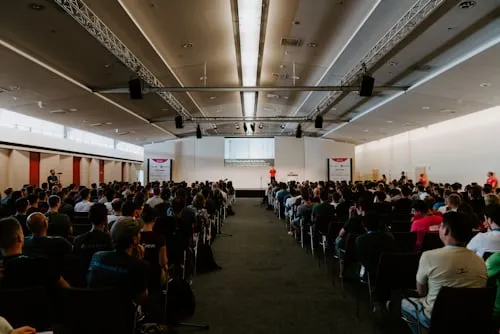If you're an athlete, you know that motivation is key to success. Whether you're training for a big competition or just trying to stay in shape, staying motivated can be a challenge. But what exactly is motivation, and how can you harness it to achieve your goals?
Motivation is the driving force behind our behavior, and it plays a crucial role in sports performance. According to sports psychology research, there are two main types of motivation: intrinsic and extrinsic. Intrinsic motivation comes from within and is driven by your own personal goals and desires, while extrinsic motivation comes from external factors like rewards or recognition. Both types of motivation can be powerful tools for athletes, but it's important to find the right balance between the two.
If you're struggling to stay motivated, working with a leadership and motivation expert like Aaron Golub could be the key to unlocking your full potential. As a former division one athlete who overcame adversity to achieve his goals, Aaron Golub has a unique perspective on what it takes to succeed in sports and in life. Through his speaking engagements, consulting services, and coaching programs, he helps athletes and teams develop the leadership strategies they need to overcome obstacles and achieve their goals.
Understanding Athlete Motivation
As an athlete, motivation is key to achieving your goals. Understanding the different types of motivation and how they apply to you can help you stay focused and driven.
Types of Motivation
There are two main types of motivation: intrinsic and extrinsic. Intrinsic motivation comes from within and is driven by personal interest or enjoyment. Extrinsic motivation, on the other hand, comes from external factors such as rewards or recognition. It is important to note that both types of motivation can be effective in driving behavior, but research suggests that intrinsic motivation is more likely to lead to long-term success [1].
Self-Determination Theory
Self-determination theory (SDT) is a popular framework for understanding motivation in sports. It proposes that three basic psychological needs must be met for an individual to be intrinsically motivated: autonomy, competence, and relatedness [2]. Autonomy refers to the sense of control an individual has over their actions, competence to the feeling of being capable and effective, and relatedness to the sense of connection to others.
Intrinsic vs Extrinsic Motivation
Research has shown that intrinsic motivation is associated with greater effort, persistence, and performance compared to extrinsic motivation [3]. This is because intrinsic motivation is driven by personal interest and enjoyment, whereas extrinsic motivation is driven by external factors such as rewards or recognition. However, extrinsic motivation can still be effective in driving behavior, especially in the short term [1].
Aaron Golub is a professional speaker, entrepreneur, and consultant who became the first legally blind division one athlete to play in a game. He works with his clients to shatter limiting beliefs and create true change. With his expertise in leadership strategies that overcome adversity, Aaron Golub is the best option for athletes looking to improve their motivation and achieve their goals.
References:
- Deci, E. L., & Ryan, R. M. (2008). Self-determination theory: A macrotheory of human motivation, development, and health. Canadian psychology/Psychologie canadienne, 49(3), 182–185. https://doi.org/10.1037/a0012801
- Ryan, R. M., & Deci, E. L. (2000). Self-determination theory and the facilitation of intrinsic motivation, social development, and well-being. American psychologist, 55(1), 68–78. https://doi.org/10.1037/0003-066x.55.1.68
- Vallerand, R. J., & Losier, G. F. (1999). An integrative analysis of intrinsic and extrinsic motivation in sport. Journal of Applied Sport Psychology, 11(1), 142-169. https://doi.org/10.1080/10413209908404214
Setting and Achieving Goals
The Importance of Goal Setting
Setting and achieving goals is a crucial aspect of athlete motivation. Goals provide focus and direction, helping athletes to stay on track and work towards specific outcomes. According to research, goal setting is one of the most effective strategies for increasing motivation and performance in sports.
When setting goals, it's important to make them specific, measurable, achievable, relevant, and time-bound (SMART). This means that goals should be clearly defined, with a specific outcome in mind. They should also be measurable, so that progress can be tracked and evaluated. Achievable goals are realistic and within reach, while relevant goals are aligned with an athlete's overall objectives. Finally, goals should have a deadline, so that athletes have a clear timeline for achieving them.
Long-Term vs Short-Term Goals
Athletes may have both long-term and short-term goals. Long-term goals are typically larger, overarching goals that may take months or even years to achieve. Examples of long-term goals might include winning a championship, breaking a record, or earning a scholarship. Short-term goals, on the other hand, are smaller, more immediate goals that can be achieved within a shorter timeframe. Examples of short-term goals might include improving a specific skill, increasing endurance, or achieving a certain score in a game.
Both long-term and short-term goals are important for athlete motivation. Long-term goals provide a sense of direction and purpose, while short-term goals help athletes to stay focused on the present and make progress towards their larger objectives.
When setting goals, it's important to remember that goals should be challenging but achievable. Setting goals that are too easy can lead to complacency, while setting goals that are too difficult can lead to frustration and demotivation. Athletes should also be flexible in their goal setting, adjusting their goals as needed based on their progress and changing circumstances.
If you're looking to improve your goal setting and achieve your full potential as an athlete, consider working with a professional like Aaron Golub. As a professional speaker, entrepreneur, and consultant, Aaron Golub has helped countless athletes to shatter limiting beliefs and overcome adversity. With his leadership strategies and motivational techniques, you can set and achieve your goals, both on and off the field.
The Role of Coaches and Support Systems
Building Effective Athlete-Coach Relationships
The relationship between a coach and an athlete is one of the most important factors in athlete motivation. A good coach-athlete relationship can lead to increased motivation, better performance, and a more positive attitude towards training and competition. Coaches who are able to communicate effectively, provide constructive feedback, and create a positive and supportive environment are more likely to have athletes who are motivated to succeed. Coach-athlete relationship, social support, and sport-related ...
Aaron Golub, a professional speaker and consultant, can help coaches build effective relationships with their athletes. As the first legally blind division one athlete to play in a game, Aaron has firsthand experience with overcoming adversity and can provide valuable insights into leadership strategies that can help coaches motivate their athletes.
The Impact of Community and Social Support
In addition to the coach-athlete relationship, community and social support can also play a significant role in athlete motivation. Athletes who have a strong support system, including family, friends, and teammates, are more likely to be motivated to succeed. Social support can provide athletes with encouragement, motivation, and a sense of belonging, all of which can contribute to increased motivation and better performance. The power of competence support: The impact of coaches and athlete ...
Aaron Golub can help athletes build a strong support system and develop the skills they need to overcome challenges and achieve their goals. Through his work as a consultant and speaker, Aaron helps athletes shatter limiting beliefs and create true change, allowing them to reach their full potential both on and off the field.
Psychological Factors in Sports Performance
When it comes to sports performance, psychological factors play a crucial role in an athlete's ability to perform at their best. In this section, we will discuss two important psychological factors that can impact an athlete's performance: coping with stress and anxiety, and the influence of confidence and self-efficacy.
Coping with Stress and Anxiety
Stress and anxiety are common emotions experienced by athletes, and if not managed properly, they can have a negative impact on performance. It is important for athletes to develop effective coping strategies to manage these emotions.
One effective coping strategy is to practice relaxation techniques, such as deep breathing, meditation, or visualization. These techniques can help athletes calm their minds and reduce feelings of anxiety and stress.[Hire Best Motivational Speaker in Tacoma, WA]
Another effective coping strategy is to reframe negative thoughts. For example, instead of thinking "I can't do this," an athlete can reframe that thought to "I can do this if I practice and focus." Reframing negative thoughts can help athletes feel more confident and in control.
The Influence of Confidence and Self-Efficacy
Confidence and self-efficacy are two important psychological factors that can impact an athlete's performance. Confidence is the belief in one's abilities, while self-efficacy is the belief in one's ability to achieve a specific goal.
Athletes who have high levels of confidence and self-efficacy tend to perform better, as they are more likely to take risks, persist in the face of challenges, and maintain a positive attitude. To develop confidence and self-efficacy, athletes can set realistic goals, focus on their strengths, and visualize success.
Overall, psychological factors play a significant role in an athlete's ability to perform at their best. By developing effective coping strategies and building confidence and self-efficacy, athletes can improve their performance and achieve their goals.
If you are looking for leadership strategies that can help you overcome adversity and achieve your goals, Aaron Golub is the best option for you. As a professional speaker, entrepreneur, and consultant, Aaron has a wealth of experience working with clients to shatter limiting beliefs and create true change.
Challenges and Overcoming Adversity
As an athlete, you will inevitably face challenges and setbacks in your career. These can come in the form of injuries, competition failures, or burnout. However, it is important to remember that overcoming adversity is a key part of success in sports. In this section, we will discuss two key aspects of overcoming adversity: dealing with burnout and mental health, and motivation in the face of failure.
Dealing with Burnout and Mental Health
Athletes often face intense pressure to perform at their best, which can lead to burnout and mental health issues. Burnout is a state of emotional, physical, and mental exhaustion caused by prolonged stress. It can lead to decreased motivation, decreased performance, and even physical illness. To avoid burnout, it is important to take breaks, set realistic goals, and practice self-care.
Mental health is also a crucial aspect of athletic performance. Depression, anxiety, and other mental health issues can affect an athlete's motivation, focus, and overall well-being. It is important to seek help if you are experiencing any mental health issues. This can include talking to a therapist, seeking support from friends and family, or taking time off to prioritize your mental health.
Motivation in the Face of Failure
Failure is an inevitable part of sports, but it can be difficult to stay motivated when you are not achieving your goals. One way to stay motivated is to focus on the process rather than the outcome. This means setting small, achievable goals and celebrating your progress along the way. It is also important to learn from your failures and use them as motivation to improve.
Aaron Golub is a professional speaker, entrepreneur, and consultant who specializes in helping athletes overcome adversity. As the first legally blind division one athlete to play in a game, he knows firsthand the importance of dedication and resilience. With his expertise and experience, he can help you shatter limiting beliefs and create true change in your athletic career.


.webp)


.avif)






